The practical usage of data science in real estate is still in its infancy. And it is crystal clear why. According to the U.S. Chamber of Commerce Foundation, 90% of all digital data has been created quite recently — in the last couple of years. As such, many property companies are simply not ready to capture, aggregate, analyse accumulated information effectively to guide their decision-making. Moreover, real estate firms might not even have the slightest idea of what data they need to look at, let alone how to use it.
However, this does not mean they should not try. On the contrary, if they do not start seeking ways to efficiently manage their data right now, they will eventually be outclassed by their more forward-looking competitors. They simply would not be able to stay relevant in the market.
This article sheds some light on why companies need to use data science for real estate, real-life applications, and how they can benefit from it.
Benefits for Business
In its 2019 annual review of the real estate industry and digitalisation, KPMG highlighted that companies were convinced that information needs to be at the core of a digital strategy. Still, only 25% of the respondents noted that their digitalisation strategy is data-cantered. However, most time property companies have difficulties grasping the notion of real estate data science, how they can use it, and what benefits they can derive.
Big data is characterised not only by its mere size, but also its complexity, variety, and the astonishing pace at which it is generated from multiple sources. Thus, having information at their disposal, businesses can use data science to efficiently leverage their decision-making processes. They can calculate property price indices determining property market performance and analyse economic trends to predict real estate performance.
Correct application of data science will help companies yield lucrative revenue, make informed investment decisions, and satisfy clients by helping them find their perfect homes. All in all, there is a positive impact of big data on business.
Real Estate Data Science Applications
Data science can be applied in many areas of real estate, from lead generation to making educated decisions regarding a property using geographic information systems. Let us take a closer look at several usages of data science in the sector.
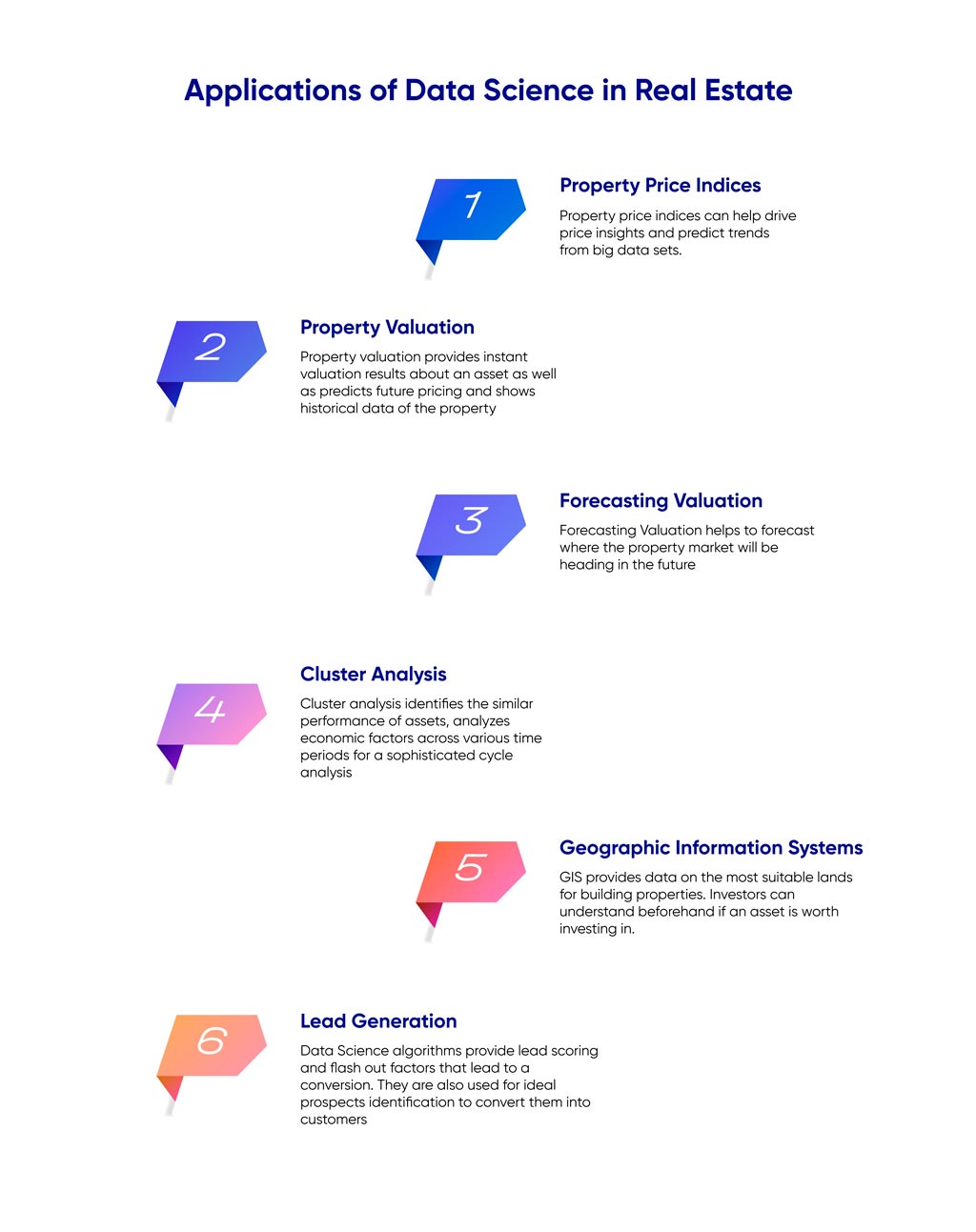
Property Price Indices The real estate sphere is quite complicated. There are no two properties that are 100% identical, even if people think they are, and the pricing of both on the market will be different. As a result, we would have quite a rare transaction on heterogeneous assets. Furthermore, two real estate agents can evaluate the same property differently, and their valuation could vary by up to 40%. So, how is it possible to thoroughly evaluate and measure property market performance?
Property price indices help drive price insights and predict trends from big information sets. For instance, statistical methods can provide an insight into historical market performance based on the quality differences in transactions.
The main features of property price index tools might include repeat sales, multi-year history of real estate data, and granular market performance to better understand sub-market performance. Such tools are perfect for investors, brokers, and real estate owners.
Property Valuation
Property valuation powered by data science is a real deal-breaker in the modern world. For instance, if a person wants to buy a certain property, he or she might use an automated valuation model that might appear as a simple website. This model will give them fair valuation results of the asset within seconds. The model can also predict future pricing and display the property’s historical data.
These types of property valuation systems are populated with real-time data. Therefore, buyers and real estate agents will always have relevant information at their fingertips. Popular examples of property valuation are Zoopla in the UK, Zillow Estimate in the United States, ZOLO in Canada, etc.
Forecasting Valuation
Real estate buyers and brokers as well as investors need to know where the property market is heading in the future. In this case, applying scientific knowledge is quite understandable. Companies can use predictive analytics to predict the value of properties in a given region. Keeping an eye on real estate value trends, purchase demand, and rental in real-time greatly is a great forecasting tool. Moreover, it is also important to track the growth of various establishments in the area, including the building of new gyms, shops, restaurants, and other lifestyle establishments, as they drastically influence a property’s value.
Cluster Analysis
The real estate market is extremely volatile. It varies not only within a certain country, but also within a certain city, town, or a specific location. Various factors – from macro and microeconomic situations to local trends, influence pricing. Another useful method of data science for real estate is cluster analysis. This method allows uncovering patterns within data sets.
Cluster analysis might be particularly useful for real estate investors. For example, if an investor has missed a chance of investing in a certain property, they can apply cluster analysis to see if there is any other property that will have similar performance and that will perform differently.
Cluster analysis also helps analyse macroeconomic factors across various periods to produce a sophisticated cycle analysis.
Geographic Information Systems
Location has always been one vital element in the real estate industry. And with all the data available at our fingertips from a wide variety of sources, the sector can easily benefit from GIS tools.
A geographic information system is used for an in-depth geospatial analysis, an essential constituent of data science. It helps gather, analyse, and process information by using and combining different types of data, be it addresses, postcodes, geographic coordinates, etc.
After properly analysing the data, the system presents the user with advanced mapping visualisations and valuable insights. For instance, estate agents can use GIS to determine if a family with children should buy a house in a particular neighbourhood by analysing all schools and kindergartens in the area. If the suburb is not densely packed with educational institutions and the nearest school takes an hour’s ride by car, then recommending purchasing a house in a more appropriate place would be a wise decision for the agent.
GIS can also provide real estate companies with information on the most appropriate lands for building properties, malls, retail shops, surrounding wetlands, etc. Real estate investors can obtain data about a property beforehand to analyse if it is worth investing in.
Lead Generation
Quite a few companies would like to use science not only to make any predictions and forecasts on property validation, property price indices, etc. Some want to use data science in their lead generation campaigns to attract potential clients. And there is nothing impossible for data science.
One such application for lead generation – price valuation tools, has already been discussed in the article. Such software will be a lead magnet and drive traffic to a website.
To effectively handle large chunks of data and improve their lead generation campaigns, real estate companies can also use data science to create a comprehensive 360-degree view of prospects by applying AI-powered algorithms for predictive analysis. Such algorithms will provide lead scoring and flash out factors that will lead to a conversion. Also, by analysing data from various sources, property companies can easily identify ideal prospects and convert them into customers.
How Data Science Will Transform Commercial Real Estate
Although data science is still in its infancy in the real estate world, with the widespread adoption of technology, its applications will become increasingly available to property firms, brokers, investors, and their clients. Commercial real estate that consists of office buildings, brick-and-mortars, warehouses, restaurants, and hotels will also be transformed by data science.
The commercial real estate sphere will be able to use data science for lead generation, forecasting, prediction, and better performance. This way, companies will use data science in a wide variety of activities, as it will help enhance decision-making processes, improve strategies, manage risks, analyse behaviour, and make educated and accurate predictions. Overall, data science will become an integral part of every commercial real estate firm.
Technology Stack
Any real estate project is unique, and the same goes for its technology stack. As such, to apply data science, tech professionals should be remarkably skilled in mathematics and possess diverse hands-on experience in computer science technologies.
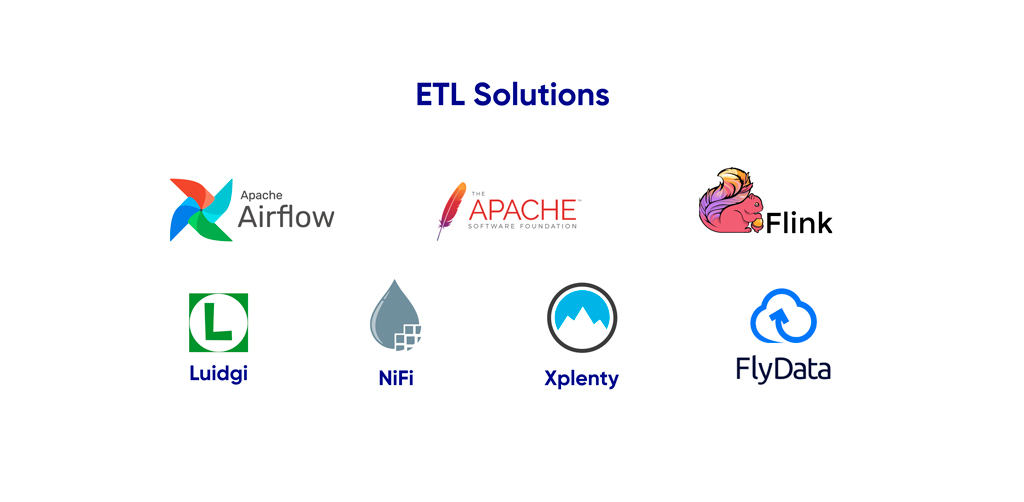
ETL Tools
Extract, Transform, Load. This tool helps manage data smartly. As information comes from different sources in various sizes and formats, it can be stored somewhat inefficiently.
As its name suggests, this tool subjects data to three main stages: it extracts information from diverse sources, converts it into unified, clear, and understandable formats, and compiles the data to privacy requirements. Once these two stages are done, an ETL tool loads the information to a data storage, usually a data warehouse.
The most popular ETL solutions are AirFlow, Luidgi, Bonobo, Flink, Apache NiFi, Xplenty, FlyData, etc.
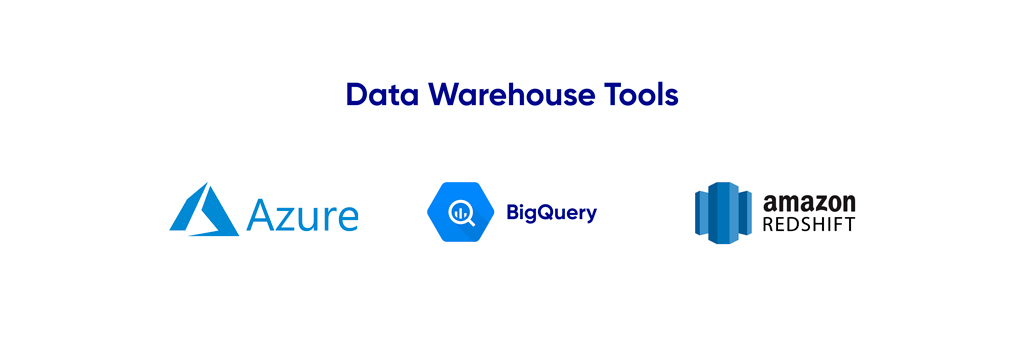
Data Warehouse Solutions
It is vital to decide on a data warehouse for storing information that comes from various sources. Companies can either use Cloud or on-premise solutions. The advantage of cloud solutions such as Azure, Snowflake, BigQuery, or Redshift is that real estate companies do not need to put the time into their maintenance and can focus on their core activities right away.
On-site data warehouse solutions also have their benefits. If a company has experience in managing on-premise software, it can easily be in control of its information.
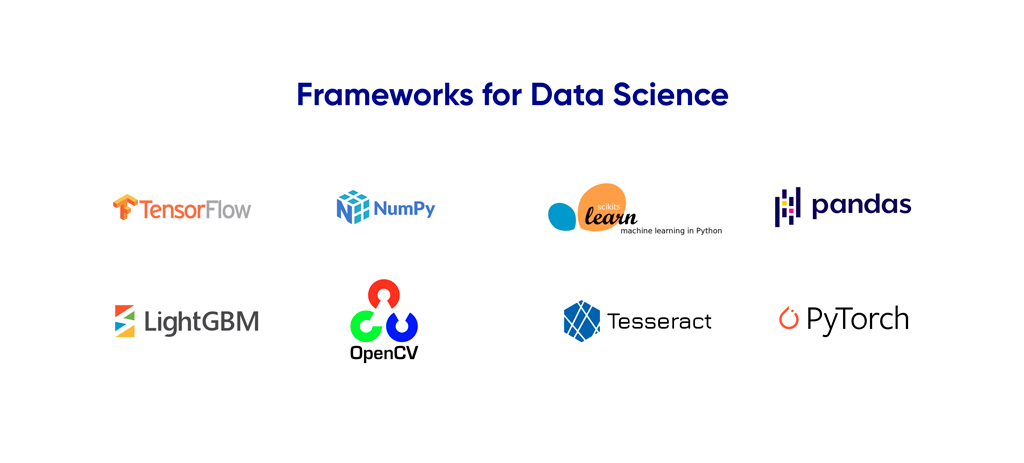
Data Science Frameworks
To create best-of-breed projects, real estate companies use various machine-learning frameworks. This software incorporates ready-to-use functionality to allow tech specialists to handle projects much faster. The most popular and widely used frameworks are:
TensorFlow
This framework is considered one of the best frameworks and is used for creating sophisticated ML and deep learning models. It allows easily analysing various data, from images to SQL.
Scikit-learn
This is a Python-based framework used for data mining and analysis.
Pandas
Originally used by the financial sector, now more widely utilised by other business domains. Pandal helps in dealing with unstructured and messy data.
NumPy
The open-source library powers Python, C, and Fortran with powerful computing. It helps with quantum & statistical computing, signal, geographic & image processing, mathematical analysis, etc.
LightGBM
LightGBM is a high-performing framework that uses tree-based learning algorithms.
OpenCV
The robust computer visions library offers a wide range of tools for data science.
Tesseract
This tool is used for text detection and is able to detect more than a hundred languages in text, video, Gmail.
PyTorch
The ML framework boosts the entire circle of product development.
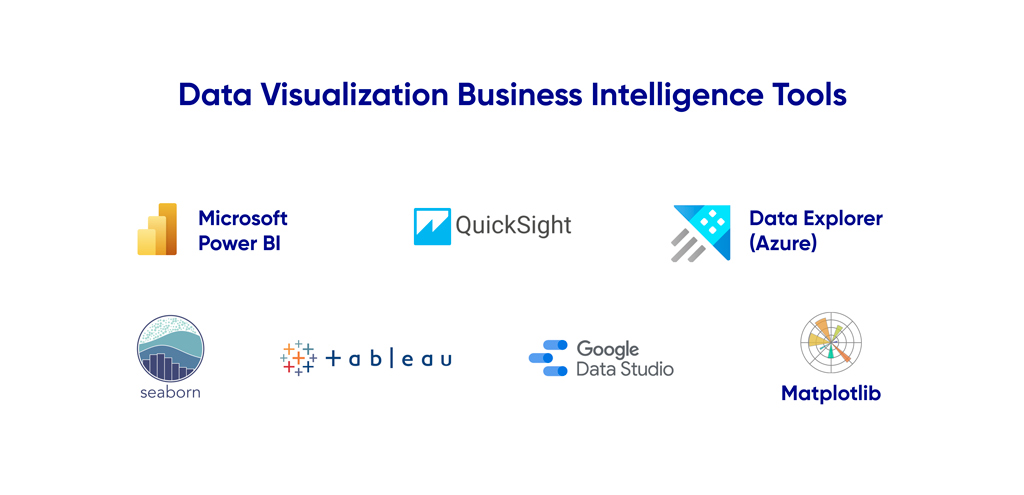
Data Visualization Tools and Business Intelligence Software
To utilise data, specialists have to pick up advanced visualisation tools and business intelligence for a real estate project. The most popular on-premise software is Microsoft Power BI, Tableau, Python libraries Seaborn, and Matplotlib. Many established corporations also provide a wide array of tools for data visualisation — Google’s Data Studio, Amazon’s Quick Sight, and Azure’s Data Explorer.
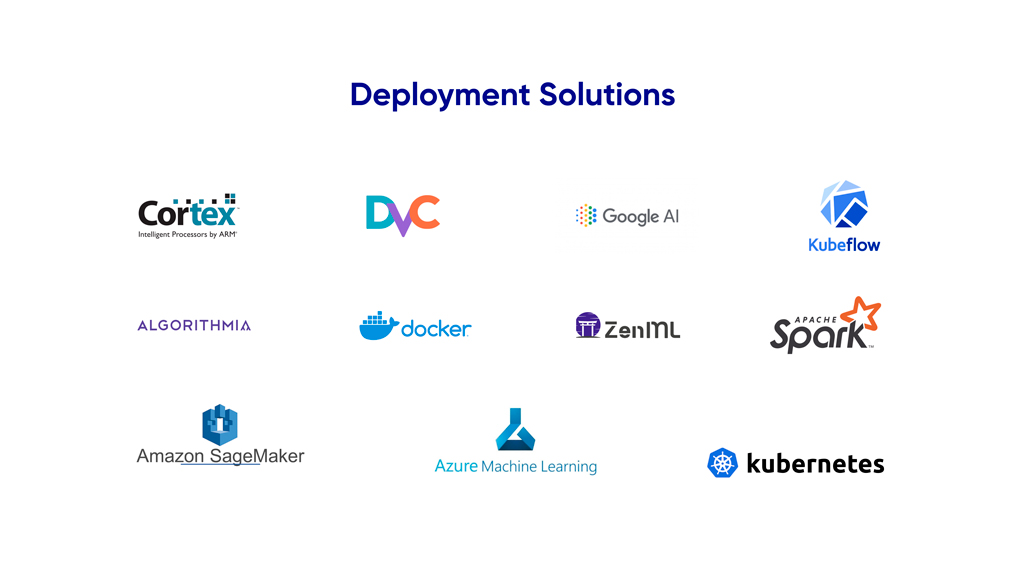
Deployment Services
Last but definitely not least is deployment. The right choice of the deployment infrastructure is specific to a certain model and/or business. There are a few types of services:
- Cloud Machine Learning Service Providers — Amazon SageMaker, Azure ML, Google AI
- On-premise/Hosted — Algorithmia, Spark
- Open-source — TensorFlow Serving, Kubeflow, Seldon, Anyscale, Cortex, ZenML
Wrapping Up
Data science is something that should be adopted right away to analyse and utilise all incoming information that real estate companies get day by day, hour after hour. Otherwise, they are risking being outperformed by shrewd rivals. Adopting data science is therefore becoming a necessity. However, there is nothing to be afraid of, as it will have a huge positive impact on the real estate domain. Property companies, brokers, and investors as well as their clients will be able to apply data science in several ways: for price indices, property & forecasting valuation, cluster analysis, geospatial analysis, and lead generation. The extracted insights from the analysed data will drive decision-making, while we will be backed up by science, and not merely a shot in the dark. If you plan to implement data science for your project and are looking for a reliable software development partner with relevant experience in science, the Light IT team will be delighted to assist you in your endeavour. Just get in touch for more information.




